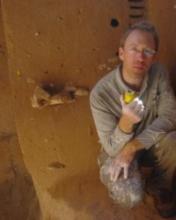The current Covid-19 pandemic provides a dramatic example of the numerous, and mostly negative, health and social outcomes of epidemics. Research on past epidemics provides a temporal depth to our understanding of our current experience, gives context and illuminates the consequences of epidemics in general. This temporal depth is crucial for predicting how epidemics might shape health and society in the future. The archaeological record gives us access to the human experiences of large pre-industrial epidemics from the Neolithic onwards. Most previous archaeological work on epidemics has focussed on the human skeletal and microbiological evidence. Here I take a different approach, and instead survey the material traces of past human experiences of epidemics, including the Athenian and Justinian Plagues, the Black Death and its many waves throughout Europe, Africa and Asia, and epidemics in Indigenous communities resulting from colonial contacts. I will discuss vignettes drawing on physical evidence from landscapes, built environments, technologies, and artefacts show that apparently similar epidemics could have deeply different consequences. I highlight how archaeological research on past epidemics helps us to think about our current pandemic experience, and prepare for the future.
